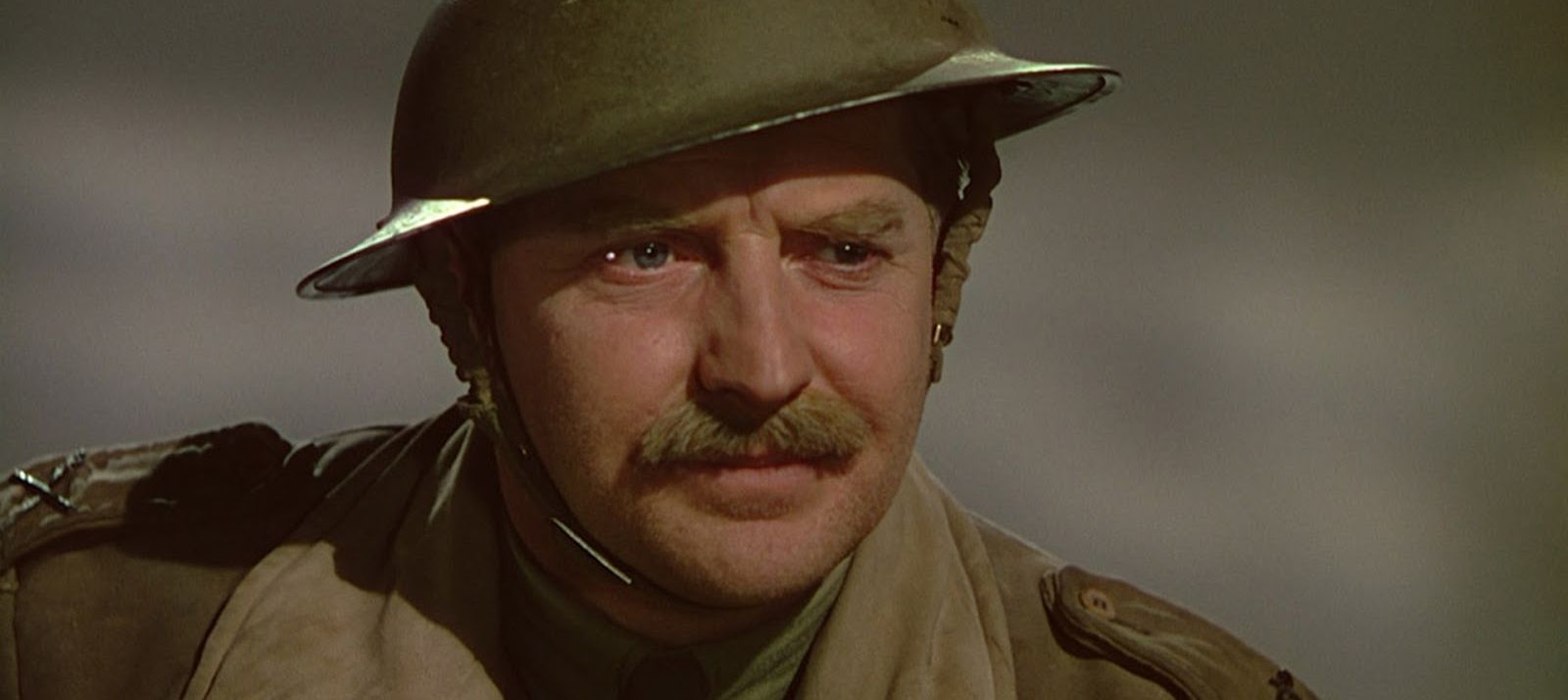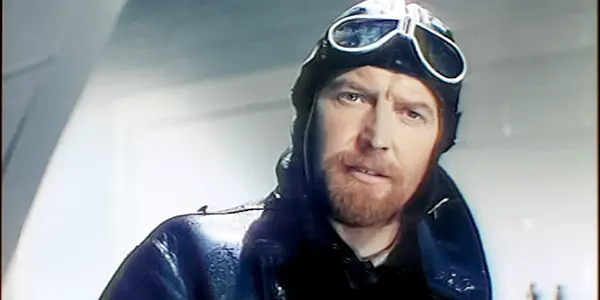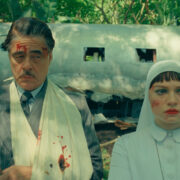Profile: Roger Livesey – Heart & Soul of Powell & Pressburger

Lapsed scriptwriter and dad, currently failing to encourage my children…
How is it that so many people remain unaware of the mighty Roger Livesey? This peerless actor was the centrepiece of many of the finest films in British history. Born in Barry, South Wales in 1906, Livesey is rarely invited into the superclub of immortal Welsh greats like Richard Burton, Anthony Hopkins, Rachel Roberts and Hugh Griffiths. His work has withstood the ravages of time, nay improved, unlike so many of his contemporaries’ efforts; yet he is a stranger to modern moviegoers.
Even teenagers, startled to learn that Star Wars was not the first ‘talkie’, have heard of David Niven. Stewart Granger and Rex Harrison are regularly disinterred, if only for the controversy of their flinty tempers to be called to account. Dirk Bogarde went and made himself immortal by becoming an acclaimed novelist and diarist. And of course, the Angry Young Men brigade: Oliver Reed, Richard Harris, and Peter O’ Toole et al became modern icons anew, via the popular exuberance of their tipsy extra-curricular adventures and the New Lad generation that subsequently lionised them.
Britain’s Greatest (Unknown) Leading Man
Like the best wedding china perhaps, Roger Livesey’s name is hardly ever brought out of the cupboard. Mention his name to your friends and study the look in their eyes. The name may be vaguely familiar to them but you can hear an internal whisper, ‘…no that was Richard Todd. Roger Livesey? Wasn’t he in…no that was Kenneth More. Roger…Roger…Roger… Brief Encounter?’
Actually, had Trevor Howard succumbed to one of his regular hangovers and stayed in bed on audition day, those really would be Livesey’s socks being dried by Celia Johnson in that boating shed. It would have been his cello-chord voice muttering, ‘You know what’s happened, don’t you?’ Livesey was David Lean’s first choice for the role of Dr. Alec Harvey, but at the last minute Lean saw something suitably complicated behind Howard’s eyes, and a post-war British icon was born. Not exactly a ‘Ronald Reagan as Rick Blaine’ casting debacle, but it would be fascinating to have seen Livesey’s eyes meeting Johnson’s through the open window of that train carriage.
The De Niro to Michael Powell‘s Scorsese
Indeed, Roger Livesey was a bona-fide romantic lead when Brief Encounter was being made, and his CV bore peerless references, having starred in three Powell & Pressburger masterpieces in a row: The Life and Death of Colonel Blimp in 1943, I Know Where I’m Going in 1945 and finally, A Matter of Life and Death a year later.
For the best guess as to how Livesey’s Alec Harvey would have appeared, one should look to I Know Where I’m Going; a sprightly 70-years-old in November and still better than ever. In this tale of true love blossoming against the odds, aided and thwarted by nature herself on a remote Scottish island, Livesey plays the laird, Torquil MacNeil. But when we first set eyes on him, we think him a naval officer on shore leave. Wendy Hiller’s Joan Webster takes him thus. She is en route to be wed on MacNeil’s island to an elderly millionaire but high winds and treacherous seas mean that she is unable to complete the final leg of her journey. Fighting her ambition, her senses, and her rationale, she eventually finds it impossible not to fall in love with Torquil and literally marches into his arms.

It’s easy to see why. From his first appearance, suited and booted in HM Navy’s finest duds, cradling his pipe, Torquil MacNeil is British decency incarnate. Even tempered with a worldly wisdom, he answers the interrogation from his hostess with straight, immediate answers. He is charming, handsome and uncomplicated. Yet when he watches Joan leave the room, he wears an expression of infant curiosity. He’s clearly fallen for her but is still waiting for the penny to drop. The moment it does, in a typically contrary Powell / Pressburger manner, Joan asks him if they can sit at separate tables in the local restaurant. His eyes visibly twinkle, faced with such peerless propriety. ‘I think you’re the most proper young lady I’ve ever met,’ he states, as though ready to drop to one knee. From that point on, he literally cannot keep his hands off her.
By the time they attend a ceilidh: pipes, kilts, whisky and all, Torquil is in no doubt where his feelings lie. They watch from outside; Joan stood up against a ladder with Torquil holding her steady in a chaste embrace. A Highland warbler pipes out The Nut Brown Maiden (the entire plot of the film in the form of a Celtic ballad), which Torquil translates. He suddenly turns to Joan, his features alive with passion as he utters the last line: ‘You’re the maiden for me!’
Well who could possibly resist? Even at the moment when Joan is set to head over to meet her fiancé, she asks him for a kiss. It could be judicious editing, but Livesey doesn’t even wait to hear the question mark. He drops his bags and wraps his arms around her: a kiss that’s been a whole film in the making.
Life, Death, Blimps and Other Matters
A strapping six footer with a gymnast’s chest and a thatch of wavy chestnut hair, Livesey would not have looked out of place on a box of porridge oats, yet there was something marvellously unique about him. His face was a many-angled affair, with a surfeit of teeth that gave him a somewhat ovine smile – much highlighted when surrounded by a thick red beard as in A Matter of Life and Death.

Incongruously, from this sculpted matinee-idol’s visage, flowed the hoarse tones of a septuagenarian carol singer. His voice had the flow of a Brüch concerto and he would modulate his sentences with sudden harsh intones, loud yawning howls and the sudden unexpected stretching of his vowels. Upon his lips, the letter O became a three-syllable word. Nobody has ever spoken like Roger Livesey.
The curious cadence in his voice might explain how he played old people with such extraordinary skill. His performance in The Life and Death of Colonel Blimp is impossibly astonishing in that regard. He ages from an athletic, super handsome young buck in fin de siècle Berlin, into a corpulent, balding old duffer in the 1940’s with a sincerity that De Niro and all his Method contemporaries could only dream of harnessing. For all that, he wears his skills so comfortably that they never interfere with the crux of the piece: his decades-long friendship with German officer Theo Kretschmar-Schuldorff (Anton Walbrook). The look of childish excitement upon Livesey’s face every time they meet becomes more touching every time I see it. Critic Ian Freer described this as ‘a strong shout as cinema’s greatest friendship.’ Hear hear, sir.

Powell had wanted Laurence Olivier for the lead role, but (apparently) Churchill himself intervened to stop Britain’s greatest actor playing a part in a movie that featured a sympathetic German character. They had to contend with some unknown C-lister, so unfamiliar that he was billed third under Walbrook and Deborah Kerr. I say they got off lightly: Livesey’s General Clive Wynne-Candy is the greatest British cinematic performance of the twentieth century.
“I Know What Falsity Looks Like. How Exhilarating To See The Truth.”
Irony of ironies, Livesey went on to play Olivier’s father in Tony Richardson’s The Entertainer (1960), though there were only two years between them. The same year, he played a disgraced padre in Basil Deardon’s fine caper The League of Gentlemen, allowing the weight of his shame to crush his character into a greying, enfeebled waif, barely able to look anyone in the eye. The resurrection of his self-esteem, when he impersonates a Colonel and inspects an army barracks, is a reminder of a talent that too many people have overlooked for too long.
Personally, I would erect statues of the man and declare an annual holiday in his honour, yet perhaps I would be missing the ultimate point of Roger Livesey. In his rather sweet online tribute to Powell & Pressburger, Steve Crooks notes that ‘Roger Livesey was such a nice man who was liked by just about everyone and was happily married to Ursula Jeans for 36 years. There was no scandal in his life, so no publisher is interested in a biography about him.’ In a time when so many talentless coves deafen us all with petulant entreaties to admire their absent abilities, how moving would it be to celebrate a man whose hair contained more heart and skill than they could ever possess, yet who happily retired into the background without a fuss once the job was done.
It would take a much better writer than me to pinpoint the essence of Livesey’s greatness, so I found a better writer than me to do just that. David Mamet wrote of him, ‘I recommend to you Roger Livesey, in just about anything. He was, to me, the British Henry Fonda – the perfect actor, incapable of falsity.’
Who is your unheralded hero? Which actor or actress has been languishing unfairly in the shadows, forever damned by faint praise? Their reputations need to be brought into the light. The comment box is an excellent place to start.
Sources: Steve Crooks via powell-pressburgur.org
Ian Freer. Empire Magazine: Issue 280 (October 2012)
David Mamet. The Guardian. March 21st 2003.
(top image: The Life and Death of Colonel Blimp – source: Studio Canal )
Does content like this matter to you?
Become a Member and support film journalism. Unlock access to all of Film Inquiry`s great articles. Join a community of like-minded readers who are passionate about cinema - get access to our private members Network, give back to independent filmmakers, and more.
Lapsed scriptwriter and dad, currently failing to encourage my children to watch black and white films. Alter-ego: a mild-mannered restaurateur in north Wales. Have been writing about films and food for three years in magazines like Cinema Retro and The Chap, and on websites like HeyUGuys.com and Taste of Cinema. Obsessed by cinema in all its forms.













